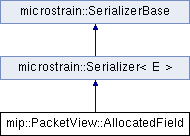|
| | AllocatedField (mip::PacketView &packet, uint8_t *buffer, size_t space) |
| |
| AllocatedField & | operator= (const AllocatedField &)=delete |
| |
| uint8_t * | allocateOrCancel (size_t length) |
| |
| bool | commit () |
| |
| void | cancel () |
| |
| template<typename... Ts> |
| bool | insert (const Ts &... values) |
| | Serializes one or more values. More...
|
| |
| template<typename... Ts> |
| bool | extract (Ts &... values) |
| | Deserializes one or more values. More...
|
| |
| template<class T , class S > |
| bool | extract_count (T &count, S max_count) |
| | Deserializes an integer with maximum permissible value. More...
|
| |
| template<class T , class S > |
| bool | extract_count (T *count, S max_count) |
| |
| | SerializerBase ()=default |
| |
| | SerializerBase (uint8_t *ptr, size_t capacity) |
| |
| | SerializerBase (const uint8_t *ptr, size_t size) |
| |
| | SerializerBase (microstrain::ConstU8ArrayView buffer) |
| |
| | SerializerBase ()=default |
| |
| | SerializerBase (uint8_t *ptr, size_t capacity) |
| |
| | SerializerBase (const uint8_t *ptr, size_t size) |
| |
| | SerializerBase (microstrain::ConstU8ArrayView buffer) |
| |
| uint8_t * | getPointer (size_t required_size) |
| | Obtains a pointer to the current offset for reading/writing a value of the specified size. This function does NOT advance the offset value. Generally, you should use getPtrAndAdvance() instead. More...
|
| |
| uint8_t * | getPtrAndAdvance (size_t size) |
| | Obtains a pointer to the current offset for reading/writing a value of specified size, and post-increments the offset by that size. Use this function just like pointer(). More...
|
| |
| void | invalidate () |
| | Marks the buffer as invalid, i.e. overrun/error state. All further accesses via pointer(), getPtrAndAdvance(), etc. will fail. (basePointer() and capacity() remain valid) More...
|
| |
| size_t | setOffset (size_t offset) |
| | Sets a new offset and returns the old value. This can be used to save/restore the current offset. Calling setOffset() after an overrun with an in-range (i.e. non-overrun) value restores the non-overrun status. More...
|
| |

 Public Member Functions inherited from microstrain::Serializer< E >
Public Member Functions inherited from microstrain::Serializer< E > Public Member Functions inherited from microstrain::SerializerBase
Public Member Functions inherited from microstrain::SerializerBase Static Public Attributes inherited from microstrain::Serializer< E >
Static Public Attributes inherited from microstrain::Serializer< E > 1.8.17
1.8.17